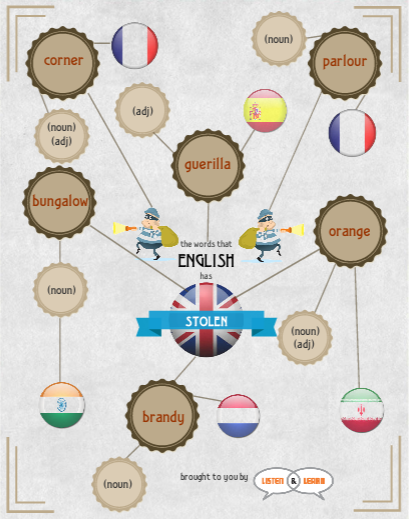Everyday Words The English Language Has Stolen
Table of Contents
English as we know it has only really existed since the 17th century (not to say it hasn’t been developing since around the 5th century as Old English). Considered a Germanic language, with Scandinavian influences, the tongue has gone through quite the transition to reach the YOLO stages we’re currently experiencing. English is a language that’s always developing and growing, and it has snatched some interesting words from other tongues over the years. Some of these words have been changed to the version we know them as today, and some are no different from their original form.
Here are just a few words that English has stolen from other languages, and are used so often, you might not have known they originated elsewhere:
1. Corner
(noun) a place or an angle where two or more sides or edges meet.
(adj) to force into a position
The word corner originally comes from the Latin cornua meaning ‘horn’ or ‘point’, which makes sense considering that corners are often pointy and sharp. From the original Latin, it transitioned into the Old French word corniere ultimately ending up as the word corner we now know.
2. Parlour
(noun) a sitting room in a private house
(noun) a room or a building specifically set aside for milking cows
(noun) a shop or business that sells specific goods, such as an ice cream parlour or a tattoo parlour.
Parlour (or parlor) isn’t something you hear very often unless it refers to the third definition, though the concept of a place in your house reserved for guests and nice conversation is a word we should all be bringing back into our vocabularies! It comes from the Latin parlare meaning ‘to speak’ and then again from the Old French parlur meaning ‘a place for speaking’. It’s existed as the word we know it as since Middle English, though its usage now is not as common in average vernacular as when it was first used in the 1800s.
3. Bungalow
(noun) a type of house that usually has no upper floors or rooms and a large, broad front porch.
Bungalows are common family homes and can be quite big despite not having multiple floors.The word actually comes from the Hindi बंगला (baṅglā), meaning ‘in the style of Bengal’. It was first used by the British East India trading company workers to describe the working class housing found in the slums of India, and later on took to mean the spacious rooms of the British Raj.
4. Orange
(noun) A citrus fruit
(adj) the colour of the aforementioned citrus fruit (a mixture of the colours red and yellow)
The word orange as we know it actually comes from the Persian narang and the Arabic naranj. The word itself seems to have started (or at least has a longer history) in Sanskrit, and the Persian and Arabic languages have simply used the original Sanskrit in their adaptation. The same can be said of the connection to Old French. All of these words are generally used to describe the fruit. The earliest recorded writing of the word ‘orange’ in English is in the early 13th century, and in that case referred to the fruit.
5. Guerrilla
(adj) A type of warfare that is irregular and unplanned
Guerrilla warfare or simply the word ‘guerrilla’ (not be confused with ‘gorilla’, as they are homophones) originally comes from the Spanish word Guerra meaning war. It was first introduced during the Peninsular War of 1808-1814, fought between the Spanish and French during Napoleon’s reign. Then it meant ‘little war’, because of the smaller ‘guerrilla’ groups the Spanish broke into in order to attack and win in battle. It was appropriated into English around this point.
6. Brandy
(noun) A strong alcoholic spirit distilled from wine or juice
Some form of brandy exists in almost every country. Hungary has its palinka, and Germany has its schnapps, which can be considered similar. It’s interesting to note that the word ‘brandy’ comes from the Dutch words branden meaning burnt or distilled, and wijn meaning wine. It was first really used in English in the mid 16th century, as this was when it was introduced by Dutch merchants to the English.
Want to learn even more interesting words in the English language? Why not contact us now to find courses in your area!



